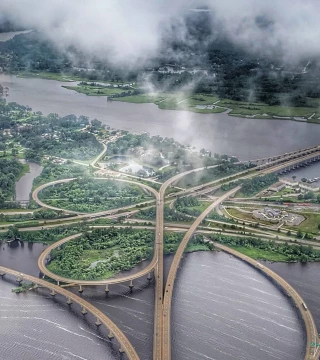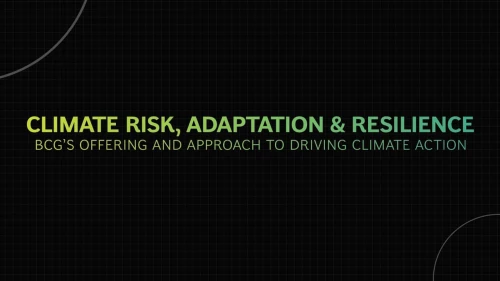Our Approach to Climate Risk, Adaptation, and Resilience
BCG empowers organizations to move from reactive risk mitigation to strategic climate resilience—embedding sustainability into decision-making, strengthening systems, and exceeding regulatory expectations. We bring trusted partnership, sector-specific insight, and advanced analytics to support governments and companies alike.
For the Public Sector
We help governments and international organizations define climate resilience as a national priority—and deliver it at scale.
- Benchmark plans, raise ambition. Assess local and national adaptation strategies using BCG’s proprietary framework and global best practices.
- Clarify climate risks and impacts. Deploy advanced analytics to model physical risk across social, economic, and natural systems.
- Make the case for action. Quantify the cost of inaction and define a bankable pipeline to secure adaptation and resilience financing.
- Align stakeholders. Partner across government, civil society, and industry to accelerate implementation and ensure inclusive climate protection.
For the Private Sector
We help companies turn climate risk into competitive advantage—fortifying operations, protecting assets, and upholding responsible business practices. When companies treat regulatory and societal expectations as strategic inputs, they unlock cost efficiencies, revenue growth, and long-term value.
- Map exposure. Identify physical climate risks, such as extreme heat and flooding, across geographies and facilities.
- Quantify impact. Assess how risk translates to operational disruption and financial loss down to EBITDA effects.
- Prioritize response. Identify and sequence adaptation measures based on risk severity, feasibility, and business value.
- Advance collective resilience. Partner with public actors and peers to shape systemic solutions and co-invest in resilient infrastructure.
Our Client Work in Climate Risk, Adaptation, and Resilience



Our Partnerships in Climate Risk, Adaptation, and Resilience
UN High-Level Climate Change Champions
As part of our collaboration with the UN Climate Change High-Level Champions, BCG has conducted in-depth research to define the challenges and requirements for achieving the Sharm el-Sheikh Adaptation Outcomes by 2030. Drawing on global experience across public and private sectors, our reports outline what’s needed to meet bold—but actionable—goals in four critical areas of climate resilience.




Our Insights on Climate Risk, Adaptation, and Resilience

approaches to manage physical climate risk.















